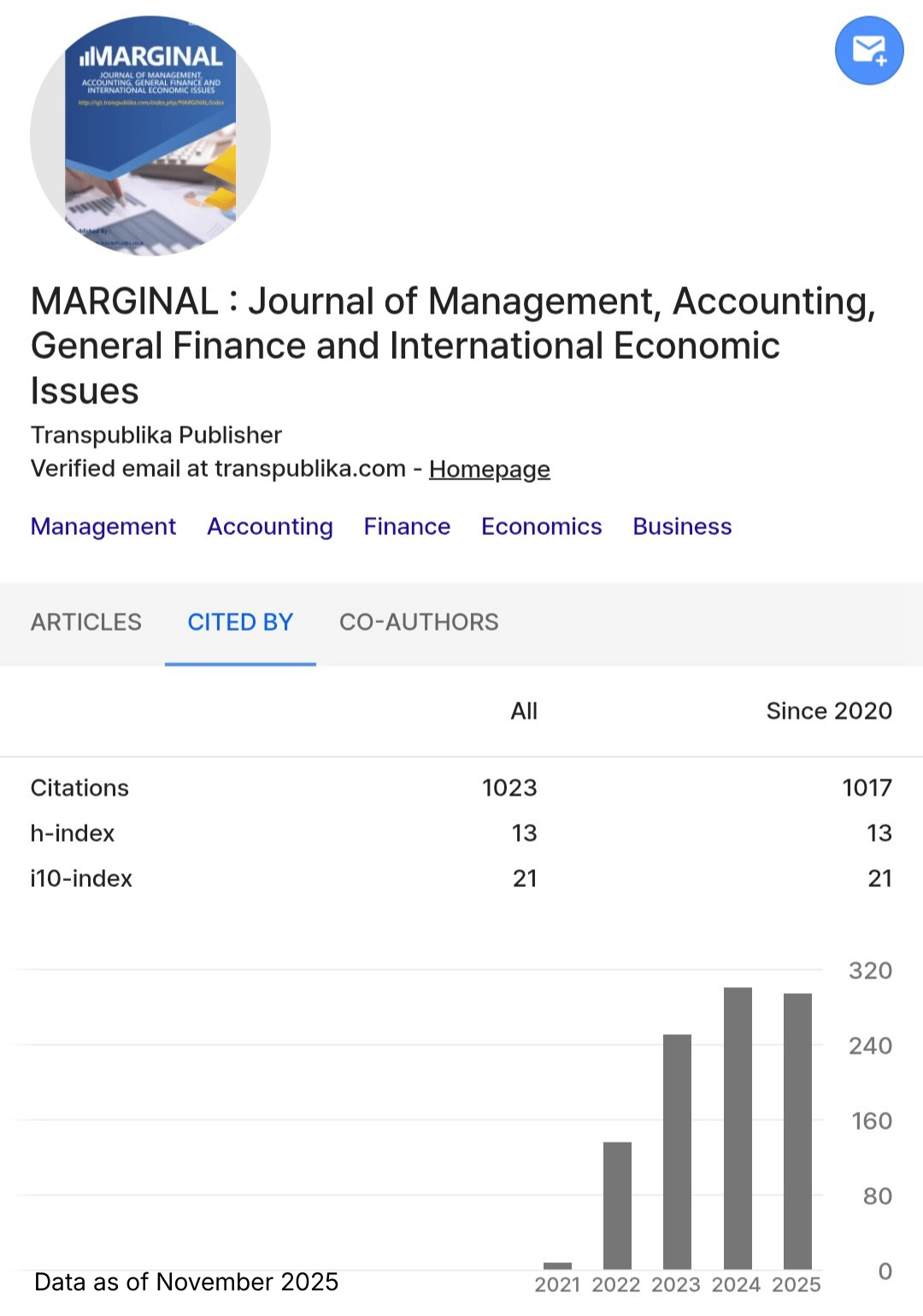THE EFFECT OF APPLICATION OF AUDIT DIGITALIZATION ON AUDITOR PERFORMANCE WITH PROFESSIONAL ETHICS AS A MODERATION VARIABLE
(Survey on KAP in Central Java)
Main Article Content
Dewi Saptantinah Puji Astuti*
Uliya Rohmah
In recent years, digitalization has transformed various aspects of business operations, including the field of auditing. The integration of digital technologies in audit processes has the potential to enhance efficiency, accuracy, and overall performance. As organizations increasingly adopt digital audit practices, it becomes essential to examine the impact of digitalization on auditor performance. The objective of this research is to assess the impact of digitalization audits on auditor performance. The study focuses on a public accounting firm located in Central Java, comprising a total of 24 individuals. Primary data was collected for this research. The population considered was the entire group of auditors working in public accounting offices in Central Java. Purposive sampling method was employed, resulting in a sample size of 60 auditors. Data was collected through questionnaires distributed directly to auditors in the public accounting offices in Central Java. Multiple linear regression analysis was used to analyze the data. The data analysis techniques included classic assumption testing, multiple linear analysis, t-test, F-test, coefficient determination (R2), and regression analysis with a moderating variable. The results of the research indicate that audit digitization has a significantly positive influence on auditor performance. However, professional ethics was found to have no moderating effect on the influence of audit digitization on auditor performance in public accounting firms in Central Java.
Aren, S., & Zengin, A. N. (2016). Influence of financial literacy and risk perception on choice of investment. Procedia-Social and Behavioral Sciences, 235, 656–663.
Fotoh, L. E., & Lorentzon, J. I. (2023). Audit digitalization and its consequences on the audit expectation gap: A critical perspective. Accounting Horizons, 37(1), 43–69.
Haeridistia, N., & Fadjarenie, A. (2019). The effect of independence, professional ethics & auditor experience on audit quality. International Journal of Scientific & Technology Research, 8(2), 24–27.
Jogiyanto, H., & Abdillah, W. (2015). Partial least square (PLS) : alternatif structural equation modeling (SEM) dalam penelitian bisnis. Yogyakarta: Andi Offset.
Luh, L. C. P. N., Mahendra, I. N. B., Suwiyoga, K., Budiana, I. N. G., Mayura, I. G. P. M., Wiradnyana, A. A. G. P., Putra, I. W. A., Negara, I. K. S., Ariawati, K., & Dewi, I. G. A. S. M. (2019). Management comprehensive multidisciplinary of malignant ovarian germ cell tumors and Feto-Maternal outcome: a case series report and literature review. Open Access Macedonian Journal of Medical Sciences, 7(7), 1174.
Mulyadi. (2002). Sistem informasi akuntansi. BPFE.
Prambowo, E. S., & Riharjo, I. B. (2020). Pengaruh Independensi, Profesionalisme, dan Etika Profesi Auditor Terhadap Kinerja Auditor. Jurnal Ilmu Dan Riset Akuntansi (JIRA), 9(11).
Robbins, S. P., & Judge, T. A. (2008). Perilaku Organisasi Edisi 12 Buku 1 dan 2. Jakarta: Penerbit Salemba Empat.
Sangkala, M., Hamzah, H., & Ismail, A. M. (2021). Peningkatan Kinerja Auditor Berbasis Teknologi Informasi. Seminar Nasional Hasil Penelitian, 2550–2560.
Silalahi, C. G. Y., Muslih, M., & Zultilisna, D. (2019). Pengaruh Time Budget Pressure, Etika Profesi, Profesionalisme, Komitmen Organisasi Terhadap Kinerja Auditor (survei Pada Kantor Akuntan Publik Kota Bandung Periode 2019). EProceedings of Management, 6(2).
Sugiyono. (2017). Metode Penelitian Penelitian Kuantitatif, Kualitatif dan R&D. Alfabeta.
Sutrisno. (2021). Improvement Of Human Resources Competence With Academic Quality Policy In The Economic Sector Of Higher Education Providers In East Java. Transformational Language, Literature, and Technology Overview in Learning (TRANSTOOL), 1(1), 19–28. https://doi.org/https://doi.org/10.55047/transtool.v1i1.104
Teeter, R., Alles, M., & Vasarhelyi, M. A. (2014). Remote Audit: A Research Framework. SSRN Electronic Journal, August 2020. https://doi.org/10.2139/ssrn.2488732
Wicaksono, A., Laurens, S., & Novianti, E. (2018). Impact analysis of computer assisted audit techniques utilization on internal auditor performance. 2018 International Conference on Information Management and Technology (ICIMTech), 267–271.
Zaleha, P. A., & Novita, N. (2021). Dampak Teknologi Informasi, Etika Profesi Terhadap Kinerja Auditor. Jurnal Akuntansi Dan Auditing, 17(1), 90–114.




















